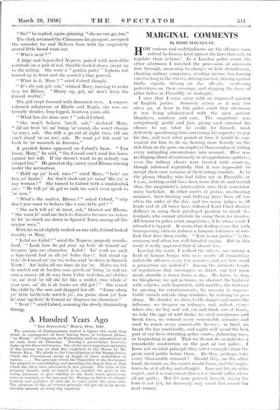MARGINAL COMMENTS
By ROSE MACAULAY.
H OW various and multitudinous are the offences coin- -11 mitted by human kind against the laws that seek to regulate their actions ! In a London police court the other afternoon I watched the procession of criminals flow through, answering to charges of debt defaultinent, cheating railway companies, evading income tax, leaving cars too long in the streets, driving too fast, driving against traffic signals, driving on the off-side, scattering pedestrians on their crossings, and slapping the faces of other ladies in Piccadilly at midnight.
I own that I came away with an improved opinion of English justice. Seriously astray as it may too often go, at least in this police court that afternoon it was being administered with the most patient blandness, courtesy and care. The magistrate was scrupulously gentle and just, giving each criminal his chance to say what he could for himself, most delicately questioning him concerning his capacity to pay his fine, and over what period of time it would be con- venient for him to do so, bearing more heavily on the rich than on the poor, on employer than employed, taking every mitigating circumstance into account. Here was no flinging about of contumely or of approbrious epithets ; -even the railway cheats were treated with courtesy, though informed regretfully that it was impossible to accept their own versions of their erring conduct. As to the plump blondes who had fallen out in Piccadilly at 1 a.m., nothing could have been more delicate and tactful than the magistrate's intervention into their somewhat noisy backchat. In other courts of justice, overbearing manners, brow-beating and bullying have been all too often the order of the day, and too many judges in all lands and at all times have followed Lord Chief Justice Jeffreys in using their privileged position to insult de- fendants who cannot retaliate by suing them for slander. All honour to police court magistrates, if he whose court I attended is typical. It seems that dealing every day with transgressing citizens induces a humane tolerance of out- look that does them credit. " Law is not just ice " is' the common and often too well-founded saying. But in t his court it really appeared that it almost was.
Leaving the court, I walked the streets, one among a herd of human beings who were nearly all committing indictable offences every few minutes, and yet how small a proportion arc indicted ! Among the intricate tangle of- regulations that encompass us about, our feet must needs stumble a dozen times a day. We loiter, we beg, we blaspheme, we spit in trains, we obstruct the highway with vehicles, with hopscotch, with marbles, the footway by queuing for entertainments, by massing in impene- trable crowds outside shop windows. by refusing to pass along. We slander, we drive to the danger and under I he influence, we trespass on railways, and, indeed, every- where else, we buy and sell, cat and drink, out of hours, we take the eggs of wild ducks, we steal mushrooms and break trees, we commit every conceivable nuisance and omit to renew every conceivable licence ; in brief, we break the law continually, and might well spend the best part of our lives attending police courts, disbursing lines, or languishing in gaol. That we do not do so indicates a remarkable moderation on the part of our police. I know not on what principle they select examples from the great erred public before them. Do they, perhaps, take every thousandth criminal ? Should they, on the other hand, decimate us, the courts would burst, and the magis- trates be at it all day and all night. Law and life arc alike unjust, and it is convenient that a few should suffer where all are guilty. But let none peacock himself, saying his • turn is not yet, for discovery may await him round the next corner.


































































 Previous page
Previous page